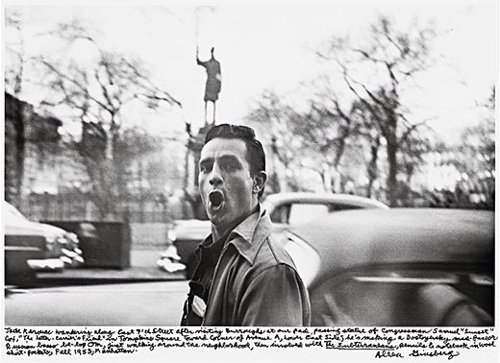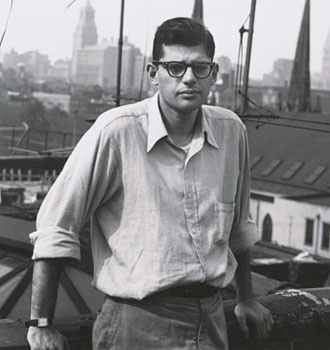
From 1953 to 1963, poet Allen Ginsberg (below) snapped thousands of candid photos of his friends, documenting the personal, intimate, and spirited lives of the writers and artists who created the major works of Beat culture. His images of Jack Kerouac (above), William S. Burroughs, Lawrence Ferlinghetti, Peter Orlovsky, and others are now on display at the National Gallery of Art in Washington DC. The exhibition, titled "Beat Memories: The Photographs of Allen Ginsberg," runs until September 16. The hardcover exhibition catalog is $32 from Amazon.
From Smithsonian:
"Allen Ginsberg's Beat Family Album" (Smithsonian)
Ginsberg started taking photographs as a young man, in the 1940s, and kept doing so through 1963, when his camera was left behind on a trip to India. The result was a kind of Beat family photo album: informal, affectionate, full of personality—and personalities. We see, among others, Jack Kerouac, William Burroughs, Neal Cassady and Orlovsky. Ginsberg liked to say he was “fooling around” with the camera (whether behind or before it). These were pictures, he felt, “meant more for a public in heaven than one here on earth—and that’s why they’re charming...
Ginsberg resumed taking pictures, more seriously, in the early 1980s. He was inspired by the example of an old friend, the photographer Robert Frank, and a new one, the photographer Berenice Abbott...
Ginsberg began using better cameras and having his photographs printed professionally. “I had been taking pictures all along,” he told an interviewer in 1991, “but I hadn’t thought of myself as a photographer.” The most noticeable difference was a simple yet distinctive way he found to marry image and text. He began writing captions, sometimes quite lengthy, on each print. He extended the practice to earlier photographs, too. His images, Ginsberg felt, “all had a story to tell, especially the old ones,” and his captioning was a way of acknowledging that. Ginsberg’s printers had to start making his images smaller to leave room for the words he was writing beneath them—not so much captions, really, as brief excerpts from a running memoir.
Beat Memories: The Photographs of Allen Ginsberg (Amazon)
from BoingBoing, Thanks!
This is amazing. Seeking that book immediately.
ReplyDelete